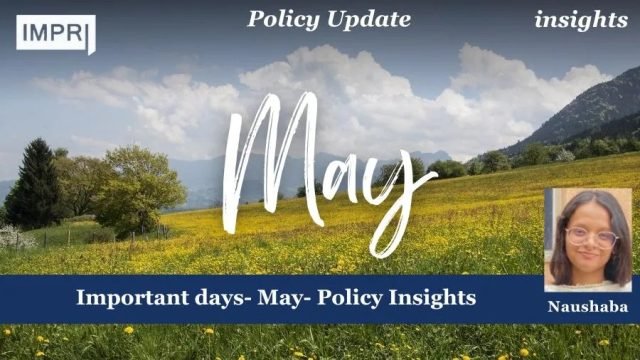Policy Update
Naushaba
May, a month blossoming with vibrant colours and fresh beginnings, serves as a canvas for a myriad of celebrations and observances. From honouring labour and labourers to recognising the significance of mental health and the environment, each day in May invites reflection and action on issues that shape our lives and communities. These are the key observances celebrated throughout the month of May.
May 1: Workers’ Day (International Labour Day)
May 1 marks Workers’ Day, also known as International Labour Day, a significant occasion that celebrates the achievements of workers worldwide. This day commemorates the labour movement’s historical struggles for better working conditions, fair wages, and the right to unionise. It serves as a reminder of the importance of solidarity among workers, advocating for their rights and dignity. In many countries, it is marked by demonstrations, parades, and various events that emphasize the ongoing fight for workers’ rights, equality, and social justice.
On May 1, India also celebrates Maharashtra Day, which commemorates the formation of the state of Maharashtra in 1960. This day is marked by various cultural events, parades, and celebrations that highlight the rich heritage and contributions of the people of Maharashtra. It serves as a reminder of the state’s identity, culture, and progress, fostering a sense of pride among its residents. Maharashtra Day emphasises the importance of regional unity and the celebration of local languages, traditions, and the state’s achievements in various fields.
May 3 is recognised as Press Freedom Day, a day dedicated to celebrating the fundamental principles of press freedom and advocating for the safety of journalists. It serves as a reminder of the critical role that a free press plays in promoting democracy, transparency, and accountability. This observance also highlights the challenges faced by media professionals worldwide, including censorship, harassment, imprisonment, threats, violence, the spread of misinformation, and the suppression of independent media, urging societies to support and protect the freedom of expression as a cornerstone of democracy.
The first Sunday of May is celebrated as World Laughter Day, a joyful occasion that emphasizes the significance of laughter in fostering peace and unity among people. This day encourages individuals to come together and embrace the healing power of laughter, promoting a sense of community and happiness. Various events and activities, such as laughter yoga sessions and community gatherings, are organised to spread joy and remind us of the importance of humour in our daily lives. World Laughter Day serves as a reminder that laughter transcends barriers, bringing people closer and enhancing overall well-being.
May 4 is recognised as Coal Miners’ Day, a day dedicated to honouring the hard work and sacrifices of coal miners who toil in challenging conditions to provide essential energy resources. This observance raises awareness about the vital role coal miners play in the economy and highlights the need for safer working environments and better rights for those in the industry. It is an opportunity to reflect on the historical significance of coal mining and to advocate for the welfare and safety of miners, recognising their contributions to energy production and industrial development.
May 4: International Firefighters Day
International Firefighters Day is observed on May 4, a day dedicated to recognising and honouring the bravery and dedication of firefighters around the world. This day serves to acknowledge the risks they face while protecting lives, property, and the environment from fires and emergencies. It promotes awareness of fire safety and the importance of supporting firefighting services. Events and activities are held to pay tribute to the courage of firefighters, emphasising the critical role they play in safeguarding communities and the need for continuous training and support in their challenging profession.
World Asthma Day is observed on the first Tuesday of May, focusing on raising awareness about asthma and improving care for individuals affected by this chronic respiratory condition. Established by the Global Initiative for Asthma (GINA), this day emphasizes the importance of education, prevention strategies, and access to treatment options, encouraging communities to recognise asthma’s impact on daily life. Events around the world aim to inform the public about the signs and symptoms of asthma, while also promoting healthy environments to reduce triggers and improve air quality.
World Athletics Day celebrates the spirit of athletics, encouraging individuals of all ages to engage in physical activity and sports. This day aims to inspire youth participation in athletics, emphasizing its role in promoting health, fitness, and social cohesion. Various events and activities are organised worldwide, from school competitions to community races, fostering a love for physical fitness and teamwork. The celebration highlights not only the achievements of athletes but also the positive impact of sports on personal development and community engagement.
World Red Cross Day commemorates the founding of the International Red Cross and Red Crescent Movement, honouring the humanitarian efforts of its volunteers and staff who provide crucial assistance during emergencies and disasters. This day serves as a reminder of the importance of compassion and solidarity, urging individuals to support those in need, whether through volunteering, donations, or simply spreading awareness. Events held on this day aim to educate the public about the principles of the Red Cross, emphasising their commitment to alleviating human suffering and promoting human dignity across the globe.
World Thalassaemia Day focuses on raising awareness about thalassaemia, a genetic blood disorder that affects millions of people worldwide. This observance seeks to educate the public about the disease, its symptoms, and the importance of early diagnosis and treatment options. By promoting screening and prevention, World Thalassaemia Day aims to encourage collaboration among healthcare professionals, policymakers, and communities to improve the quality of life for those affected by thalassaemia. It serves as a platform to advocate for better management practices, research funding, and support systems to ensure that individuals living with this condition receive the care and attention they need.
May 11: Mother’s Day
Celebrated on the second Sunday of May, Mother’s Day is a heartfelt occasion dedicated to honouring mothers and maternal figures for their unwavering love, support, and sacrifices. This day is an opportunity for families to express gratitude and appreciation through various gestures, such as giving gifts, writing heartfelt notes, and spending quality time together. It celebrates the diverse roles that mothers play in nurturing, guiding, and shaping the lives of their children, reinforcing the bond of love and respect that transcends generations.
May 11: National Technology Day
National Technology Day in India is a day dedicated to celebrating the country’s advancements in technology and innovation. This day commemorates the successful test of nuclear bombs in Pokhran in 1998, marking a significant milestone in India’s scientific progress. National Technology Day serves as a reminder of the importance of technological development in driving economic growth and improving quality of life. It encourages students and professionals to engage in science and technology, fostering a culture of innovation and excellence in various fields. Celebrations often include seminars, workshops, and exhibitions showcasing technological advancements and their impact on society.
May 12: International Nurses Day
International Nurses Day is celebrated on May 12 each year, honouring the invaluable contributions of nurses to healthcare and society. This day marks the birthday of Florence Nightingale, the founder of modern nursing, and serves as a reminder of the dedication, compassion, and expertise that nurses bring to patient care. It highlights the challenges faced by nursing professionals such as heavy workloads, long hours, emotional stress, inadequate staffing, and limited resources, all of which impact their physical and mental well-being. Various events, such as workshops, discussions, and award ceremonies, take place globally to celebrate nurses and raise awareness about the critical role they play in promoting health and saving lives.
May 15: International Day of the Family
The International Day of the Family is a day dedicated to celebrating the importance of families and promoting awareness of issues related to family well-being. Established by the United Nations, this observance emphasizes the role families play in fostering social stability, nurturing children, and promoting individual development. The day encourages discussions on family-related issues, including parenting, gender equality, and the impact of social policies on families. Activities and events are organised worldwide to promote family values, strengthen family ties, and recognise the diverse structures and dynamics that exist in modern society.
May 17: World Telecommunication Day
World Telecommunication Day, observed on May 17, celebrates the role of telecommunications in fostering global connectivity and communication. Established by the International Telecommunication Union (ITU), this day highlights the importance of access to information and communication technologies (ICTs) in promoting economic and social development. Each year, World Telecommunication Day focuses on a specific theme related to advancements in telecommunications and their impact on society. Events and activities are organised worldwide to raise awareness about the benefits of telecommunications and to advocate for inclusive and sustainable access to ICTs for all.
May 17: World Hypertension Day
World Hypertension Day is observed on May 17, dedicated to raising awareness about hypertension, also known as high blood pressure, and its impact on global health. This observance emphasizes the importance of early detection, prevention, and management of hypertension, which affects millions worldwide and can lead to serious health complications if left untreated. Each year, a specific theme is chosen to educate the public on the risks associated with hypertension, promote healthy lifestyle choices, and encourage regular health check-ups. Various activities, such as health fairs, screenings, and educational campaigns, are organised globally to empower individuals to take control of their blood pressure and overall health.
May 18: World AIDS Vaccine Day
World AIDS Vaccine Day is observed on May 18 to raise awareness about the ongoing efforts to develop an effective vaccine for HIV/AIDS. This day highlights the critical importance of research, advocacy, and education in the fight against the epidemic, as well as the need for global solidarity and funding to support vaccine development. It serves as a reminder of the progress made in HIV prevention and treatment while emphasizing the urgency of continuing the search for a safe and effective vaccine. Various events, including seminars, discussions, and community outreach programs, are organised to educate the public about HIV/AIDS and promote initiatives aimed at finding a vaccine.
May 18: International Museum Day
International Museum Day, observed on May 18, celebrates the essential role museums play in preserving and showcasing cultural heritage, history, and knowledge. Established by the International Council of Museums (ICOM) in 1977, this day highlights the importance of museums as cultural institutions that foster understanding, dialogue, and community engagement. Each year, museums across the globe organise special exhibitions, interactive events, and educational programs, inviting the public to explore the rich diversity of human culture and history. The day aims to highlight the role of museums in promoting global peace, inclusion, and cultural exchange by bridging gaps between the past and present.
May 21: National Anti-Terrorism Day
National Anti-Terrorism Day, observed on May 21 in India, honours the memory of former Prime Minister Rajiv Gandhi, who was assassinated by terrorists in 1991. This day is marked by events and educational programs that raise public awareness about the dangers of terrorism and violence while promoting the ideals of peace, unity, and non-violence. Citizens, schools, and government institutions participate in solemn ceremonies and take a national pledge to oppose all forms of terrorism and uphold democratic values. The day also serves as a platform to reflect on the impact of terrorism on society and to honour the victims and families affected by such tragedies.
May 22: International Day for Biological Diversity
May 22 is recognised as the International Day for Biological Diversity, a day dedicated to promoting the importance of biodiversity and its role in sustaining life on Earth. Established by the United Nations (1992), this observance raises awareness about the urgent need to protect ecosystems and the diverse species that inhabit them. Each year, a specific theme is chosen to focus on pressing biodiversity issues, such as habitat loss, climate change, and conservation efforts. Events and activities, including workshops, community programs, and educational campaigns, are organised globally to engage individuals and communities in protecting biodiversity and fostering sustainable practices.
Commonwealth Day, observed on May 24, celebrates the unity, diversity, and shared values of the Commonwealth of Nations, a political association of 56 member states. This day provides an opportunity to promote international cooperation, understanding, and friendship among member countries. Each year, Commonwealth Day features a specific theme that encourages discussions on relevant global issues, such as democracy, human rights, and sustainable development. Celebrations include events like flag-raising ceremonies, cultural performances, and educational activities aimed at fostering a sense of belonging and commitment to the ideals of the Commonwealth community.
Anti-Tobacco Day, also known as World No Tobacco Day, is observed on May 31 to raise awareness about the health risks associated with tobacco use and to advocate for effective policies to reduce tobacco consumption. Established by the World Health Organization (WHO) in 1988, this day highlights the importance of preventing tobacco-related diseases, promoting cessation programs, and protecting people from secondhand smoke. Each year, a specific theme is chosen to focus on different aspects of tobacco control, such as marketing strategies or the impact of tobacco on public health. Various activities, including awareness campaigns, community events, and educational programs, are organised globally to encourage individuals to quit smoking and promote a tobacco-free lifestyle.
National Endangered Species Day (Third Friday in May)
National Endangered Species Day, observed on the third Friday of May, is dedicated to raising awareness about the urgent need to protect endangered species and their natural habitats. Established by the U.S. Senate in 2006, this day encourages communities, schools, and conservation organisations to engage in educational activities, nature walks, and wildlife conservation projects. By highlighting the fragile status of many species, the observance advocates for policies and actions that preserve biodiversity, promote environmental sustainability and protect threatened ecosystems. National Endangered Species Day serves as a reminder of our collective responsibility to safeguard wildlife for future generations.
Armed Forces Day (Third Saturday of May)
Armed Forces Day, celebrated on the third Saturday of May, is a special occasion to honour the brave men and women who serve in the military and protect the nation’s freedoms. Established in 1949 in the United States, the day unifies all branches of the military—Army, Navy, Air Force, Marines, and Coast Guard—in a single tribute. Across the country, parades, air shows, military displays, and other public events are held to recognise the sacrifices and dedication of service members, both active and retired. Armed Forces Day is an opportunity for citizens to express their gratitude and respect for the military’s vital role in ensuring national security and peace.
National Memorial Day (Last Monday of May)
National Memorial Day, observed on the last Monday of May, is a solemn day of remembrance for the fallen military personnel who gave their lives in service to the United States. Originating after the Civil War as Decoration Day, it has evolved into a national observance that honours those who have died in all American wars. Memorial Day is marked by ceremonies, parades, and visits to cemeteries where flags and flowers are placed on the graves of soldiers. It is a day to honor the bravery, courage, and ultimate sacrifice of military heroes, while also reflecting on the values of freedom, peace, and unity that they fought to protect.
Hence, as May draws to a close, we reflect on a month rich with significance and observance, celebrating the contributions of workers, families, and healthcare professionals, while promoting awareness of critical global issues such as biodiversity, health, and technology. Each day of this month has served as a reminder of our collective responsibility to foster understanding, compassion, and action within our communities and beyond. The themes and observances of May encourage us to appreciate the interconnectedness of our lives, the environment, and the diverse cultures that enrich our world. Let us carry forward the lessons and commitments made during this month, striving for a healthier, more equitable, and sustainable future for all.
About the Contributor: Naushaba (she/her/hers) is a research intern at the Impact and Policy Research Institute and a postgraduate student of the Academy of International Studies, Jamia Millia Islamia. Her research interests lie in Gender Studies, Global Politics, Climate Change and Sustainable Development.
Acknowledgement: The author would like to thank Ishita Deb and Nandini Arya for the successful completion of this article.
Read more at IMPRI:



















